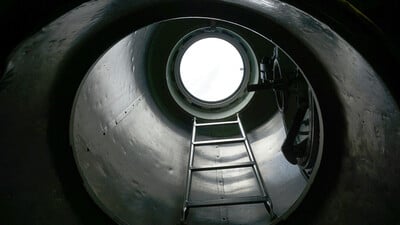Confined space training is not merely a regulatory requirement but a vital component of a comprehensive safety strategy. By equipping your team with the necessary knowledge and skills, you safeguard their well-being and contribute to the overall success and reputation of your organisation.
Understanding the Dangers of Confined Spaces
Working in confined spaces such as manholes, inspection chambers and underground vaults presents unique hazards. These environments are often fully or partially enclosed, increasing the risk of serious health and safety issues. Oxygen deficiency is a major concern, as limited ventilation can cause a decrease in oxygen levels, leading to dizziness, unconsciousness, or even death.
Toxic atmospheres pose another significant danger, with the accumulation of hazardous gases, fumes, or vapours potentially resulting in poisoning or asphyxiation. Fire and explosion risks arise from flammable substances that can ignite, causing severe injuries or fatalities. Engulfment is also a threat, where workers may be submerged or trapped by free-flowing solids or liquids. Additionally, physical hazards such as restricted movement increase the likelihood of injuries from slips, trips and falls.
What Are the Consequences of Neglecting Confined Space Training?
Failing to provide adequate confined space training can have severe consequences. Without proper training, employees are more prone to making critical errors that lead to accidents, injuries, or even fatalities.
From a legal perspective, non-compliance with the UK's Confined Spaces Regulations 1997 can result in hefty fines, legal action and potential shutdowns of unsafe work environments.
Neglecting training can also lead to operational delays, as accidents halt work and require thorough investigations, delaying project completion and increasing costs.
Furthermore, a poor safety record can damage a company’s reputation, making it harder to win contracts and retain skilled workers.
What UK Training and Certification Schemes Are Available?
Several reputable organisations in the UK offer confined space training and certification, including:
City & Guilds
City & Guilds provides a range of courses tailored to different risk levels, including low, medium and high-risk confined space entry. These are held by various accredited training centres (search “City & Guilds Training” for information on local centres).
Breathe Safety
This company offers comprehensive training programmes, from basic entry to full management and rescue courses. More details can be found at www.breathesafety.com/confined-space-training.
Reece Safety
Another company that delivers confined space training across various industries, with facilities for practical training and assessment. Visit www.reecesafety.co.uk/training-and-consultancy/confined-space for more information.
Merit Skills
Merit Skills provides a range of confined space training courses, including City & Guilds accredited programmes, with a purpose-built confined space for practical training. Learn more at www.meritskills.co.uk/courses/health-and-safety/confined-space-entry.
Element Safety
A training company that offers various courses tailored to different risk levels and rescue scenarios. Details are available at www.elementsafety.co.uk/confined-space-training.
What Essential Skills Are Covered in Confined Space Training?
Confined space training equips workers with crucial skills to ensure safety and compliance.
Hazard identification
Participants learn how to identify hazards within confined spaces, assess risks and implement necessary precautions to mitigate dangers.
PPE
Proper use of personal protective equipment (PPE) is a key focus, as understanding how to select and wear the appropriate gear can prevent serious injuries.
Atmospheric monitoring
This is another critical skill, teaching workers how to use detection equipment to identify hazardous gases and maintain safe oxygen levels.
Emergency procedures
Critical techniques, including rescue planning and execution, are also covered to prepare workers for unexpected incidents.
Legal compliance
Training also ensures that participants understand relevant legal requirements, enabling them to comply with regulations and uphold workplace safety standards.
What Are the Benefits of Regularly Updated Confined Space Training?
Investing in regular confined space training updates provides multiple advantages.
Enhanced Safety
This is the most immediate benefit, as ongoing training ensures that employees stay informed about the latest safety protocols and best practices.
Cost Savings
Companies can reduce costs related to accidents, including medical expenses, legal fees and equipment damage. A robust training program and implementation policy may also have a positive effect on the cost of employers liability insurance.
Corporate Responsibility
Prioritised training demonstrates a commitment to employee well-being and ethical business practices. Maintaining a strong safety record also enhances a company's reputation, making it more attractive to clients, partners, new recruits and regulatory bodies.
Why Drainfast Cares About Confined Space Safety
At Drainfast, we promote and encourage safe working practices in the construction industry, where unblocking chambers and pipework at the end of a project can be an arduous and dangerous task. That’s why we developed the innovative MuckStopper® range of products to prevent silt and debris from entering manholes, inspection chambers and storm drains.
Drainfast is now an approved MuckStopper reseller with an unmatched understanding and experience of how these systems can streamline your construction projects for safety and cost-efficiency. If you’d like to learn more about MuckStopper and our full range of drainage products, visit our website (https://www.drainfast.co.uk/), call 01420 555600 or leave a message on our online contact form.

Written by
Bob Stone
Technical Sales
Heading up our Technical Estimating Department, Bob is our in-house quantity surveyor.

